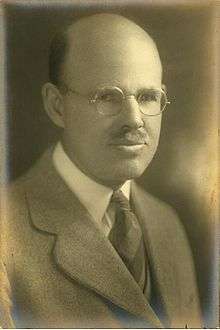Ellsworth Huntington
| Ellsworth Huntington | |
|---|---|
 | |
| Born | September 16, 1876 |
| Died | October 17, 1947 (aged 71) |
| Nationality | American |
| Alma mater |
Harvard University Yale University[1] |
| Scientific career | |
| Fields | Human Ecology |
| Institutions | Yale University |
Ellsworth Huntington (September 16, 1876 – October 17, 1947) was a professor of geography at Yale University during the early 20th century, known for his studies on environmental determinism/climatic determinism, economic growth and economic geography. He served as President of the Ecological Society of America in 1917, the Association of American Geographers in 1923 and President of the Board of Directors of the American Eugenics Society from 1934 to 1938.
He taught at Euphrates College, Turkey (1897–1901); accompanied the Pumpelly (1903) and Barrett (1905–1906) expeditions to central Asia; and wrote of his Asian experiences in Explorations in Turkestan (1905) and The Pulse of Asia (1907). He taught geography at Yale (1907–1915) and from 1917 was a research associate there, devoting his time chiefly to climatic and anthropogeographic studies. He was the 1916 recipient of the Elisha Kent Kane Gold Medal from the Geographical Society of Philadelphia.
In 1909, Huntington led the Yale Expedition to Palestine. It was his mission to determine "step by step the process by which geologic structure, topographic form, and the present and past nature of the climate have shaped man's progress, moulded his history; and thus played an incalculable part in the development of a system of thought which could scarcely have arisen under any other physical circumstances."[2]
He was on the original standing committee of the Foundation for the Study of Cycles from 1941.
Bibliography of his writing

- The Pulse of Asia: A Journey in Central Asia Illustrating the Geographic Basis of History (1907)
- "Changes of Climate and History," American Historical Review Vol. 19, No. 2 (Jan., 1913), pp. 213–232 in JSTOR
- The Climatic Factor (1914)
- Civilization and Climate (1915, rev. ed. 1924)
- "Climatic Change and Agricultural Exhaustion as Elements in the Fall of Rome," Quarterly Journal of Economics Vol. 31, No. 2 (Feb., 1917), pp. 173–208 in JSTOR
- The Red Man's Continent: A Chronicle of Aboriginal America (1919)
- World-power and Evolution (1919)
- Climatic Changes with Stephen Sargent Visher (1922)
- West of the Pacific (1925)
- The Character Of Races (1924) ISBN 0-405-09955-X
- Human Habitat (1927)
- "Agricultural Productivity and Pressure of Population," Annals of the American Academy of Political and Social Science Vol. 198, Present International Tensions (Jul., 1938), pp. 73–92 in JSTOR
- Principles of Human Geography (with S. W. Cushing, 5th ed. 1940)
- "The Geography of Human Productivity," Annals of the Association of American Geographers Vol. 33, No. 1 (Mar., 1943), pp. 1–31 in JSTOR
- Mainsprings of Civilization (1945)
See also
References
- ↑ http://www.iranicaonline.org/articles/huntington-ellsworth
- ↑ "Archived copy". Archived from the original on 2008-05-11. Retrieved 2009-03-14.
Further reading
- Fonaroff, L. Schuyler. "Was Huntington Right about Human Nutrition?" Annals of the Association of American Geographers Vol. 55, No. 3 (Sep., 1965), pp. 365–376 in JSTOR
- Martin, Geoffrey J. Ellsworth Huntington: His Life and Thought (1973)
- Spate, O. H. K. "Ellsworth Huntington: A Geographical Giant: Review," Geographical Journal Vol. 140, No. 1 (Feb., 1974), pp. 117–119 in JSTOR
External links
- Works by Ellsworth Huntington at Project Gutenberg
- Works by Ellsworth Huntington at LibriVox (public domain audiobooks)

- Works by or about Ellsworth Huntington at Internet Archive
- The Secret of the Big Trees: Yosemite Sequoia and General Grant National Parks (1921) by Ellsworth Huntington
- Articles authored in Harper's Magazine
- Ellsworth Huntington papers held at Yale University